Sen. Graham Warns Iran: If Gaza War Grows, It's Coming To You
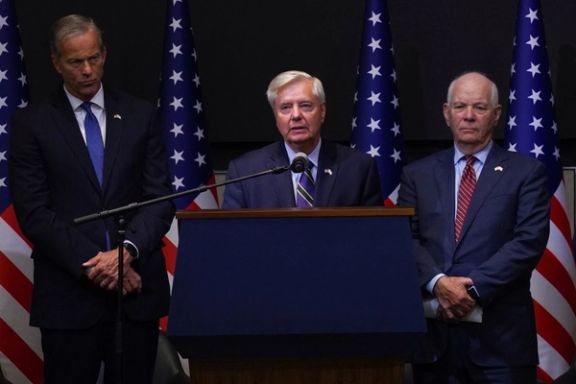
US Senator Lindsey Graham on Sunday accused Iran of involvement in the October 7 Hamas attack and warned that any escalation of the war could exact a cost from Tehran.

US Senator Lindsey Graham on Sunday accused Iran of involvement in the October 7 Hamas attack and warned that any escalation of the war could exact a cost from Tehran.
"We're here today to tell Iran: 'We're watching you. If this war grows, it's coming to your backyard,'" Graham starkly warned during a visit to Tel Aviv, without elaborating on what that meant.
Although the warning seemed to be directed at the Lebanese Hezbollah, which can open a northern front against Israel, any such decision needs to be approved by Tehran, the backer of all Arab militant groups in the region.
"The idea that this happened without Iranian involvement is laughable," Graham said in what was a rebuttal to the Biden administration that after the Hamas attack said there is no direct evidence of Iran’s involvement.
Although President Joe Biden has acknowledged Iran’s continuous support for Hamas and Hezbollah, he said last week that “Iran constantly supports Hamas and Hezbollah …. [but] did they have foreknowledge, did they help plan the attack, there’s no evidence of that at this point.”
Last week, speaking on NBC News Sen. Graham had issued a warning to Iran. He vowed to introduce a resolution in the Senate to allow “military action by the United States in conjunction with Israel to knock Iran out of the oil business.”
The Iranian regime has praised Hamas for its “heroic” attack, denying that the militants killed civilians, and pledging to continue support. Some Iranian hardliner lawmakers have even threatened direct involvement and the closure of the Hormuz Strait in the Persian Gulf if the United States directly intervenes to support Israel.
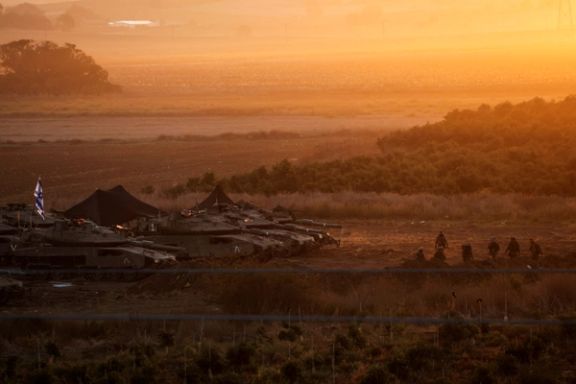
As regime officials continue to call for an escalation of Israel’s war against Iran-backed militant group Hamas, the country’s foreign minister rallied his counterpart in South Africa.
While he said the meeting was a follow up to the recent visit of President Ebrahim Raisi to South Africa in addition to discussions on bilateral relations, he used it as a chance to rally support under the banner of apartheid amid a battle against terror which threatens to become an Iran-driven proxy war.
Touching on the old wound of apartheid, Hossein Amir-Abdollahian told a press conference after meeting his counterpart Naledi Pandor: “Mr [Nelson] Mandela is widely recognized as a symbol of the struggle against apartheid, especially today, when the world witnesses the massacre by the illegitimate Israeli regime against the resilient and oppressed people of Gaza.”
Apartheid by its definition is a policy of segregation on the grounds of race or religion, as was seen in the black versus white policies of South Africa. In Israel, a multitude of faiths live together including Jews, Muslims, Christians, Druze and Baha’i.
Continuing the war cry, which has been loud and clear from the foreign minister and a wealth of other regime officials from the Supreme Leader and President to lawmakers, he once again warned of the explosive nature of the war declared by Hamas on October 7, which has incurred brutally devastating airstrikes in retaliation from Israel.
”From this tribune, I declare that today the region is like a powder keg,” said Amir-Abdollahian. “Any miscalculation in continuing the genocide and compulsory displacement can have serious and bitter consequences, both in the region and against the interests of warmongers,” referring to Iran’s multitude of proxies around the region baying for blood.
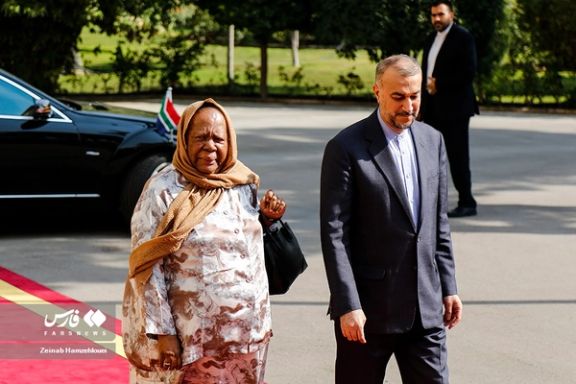
It comes just days after Pandor spoke with Hamas’ political head, Ismail Haniyeh, who rules from Turkey and Qatar. She told him of “South Africa’s solidarity and support” for the Palestinian people and “expressed sadness and regret for the loss of innocent lives on both sides”, causing domestic backlash from the South African Jewish community which accused her of siding with the terror proxy.
Fearing Iranian interference, the US and UK have mobilized warships and support for Israel after the attacks of October 7 which left at least 1,400 civilians dead and has seen over 300 more soldiers killed.
Israel’s harsh response as it vows to wipe out Hamas, has led to thousands more Palestinians dead and around 750,000 displaced as the proxy’s war continues to strangle the people of Gaza.
US Defense Secretary Lloyd Austin announced on Sunday that after detailed discussions with President Joe Biden on recent escalations by Iran and its proxy forces across the Middle East, he had directed a series of additional steps to further strengthen the Department of Defense posture in the region.
In the announcement on X, he said: “These steps will bolster regional deterrence efforts, increase force protection for U.S. forces in the region, and assist in the defense of Israel. I will continue to assess our force posture requirements in the region and consider deploying additional capabilities as necessary.”
While airstrikes in Gaza continued to target Hamas infrastructure and leadership, buried deep in civilian heartland from mosques to hospitals, in neighbouring Syria, where Iran has a military presence, Damascus and Aleppo international airports were hit once again in the early hours of Sunday, putting both out of service and killing two workers.
A key route for Iranian weaponry and other military shipments into the region, disabling Syrian infrastructure has been an ongoing shadow war for Israel in its battle to keep its borders safe from Iran. During Sunday morning’s Israel Defence Forces press briefing, its spokesman typically claimed he could not comment.
On Israel’s northern border, further clashes came from Iran’s biggest regional proxy, Hezbollah, which had terrorists killed during attempted infiltrations and attempted UAV and anti-tank missiles fired during Sunday.
It has become the most deadly escalation between Israel and Lebanon since the 2006 Israel-Hezbollah war. Hezbollah said four fighters were killed in heavy exchanges of fire on Sunday and another died of wounds sustained earlier, raising to 24 the number of its members killed since October 7.
Lebanese security sources said 11 fighters with Palestinian militant groups in Lebanon had also been killed in the volatile border region, alongside four civilians. At least five Israeli soldiers and one civilian have been killed on Israel's side of the frontier, according to Israeli military reports.
A further 14 villages have also been evacuated and 120,000 Israelis from both north and south are now in evacuation facilities.
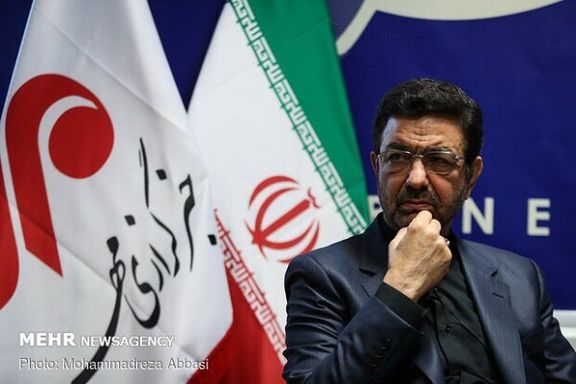
Iranian officials continue to signal the possibility of an expanded front against Israel, despite repeated denials of the regime's green light to the Hamas attack on Israel.
Fadahossein Maleki, a member of the National Security Committee in the Iranian Parliament, said, "If Israel continues its ruthless operations, we will form a new front, extending far beyond the 1973 front [Yom Kippur War], which led to Israel's defeat. In the new front, Iran will play a significant role."
As thousands of Israelis and Palestinians continue to lose their lives in the conflict initiated by Hamas which bombarded Israel with thousands of missiles and an infiltration of its terror troops on October 7, he said the wave of support seen around the world is because "Palestine and its people hold a special place among the Muslim world."
Iran's proxy Hezbollah has already been actively attempting to infiltrate Israel's northern border in addition to sending UAVs and anti-tank missiles since the war began. Last week, Iran's Yemen proxy, the Houthis, also sent cruise missiles and drones launched toward Israel, intercepted by the US Navy.
Supporting the events of October 7 when Hamas declared war on Israel, Maleki justified the terror group's attack which saw hundreds of civilians slaughtered, including pregnant women, children and the elderly. A further 212 or more are being held hostage by the terror group in Gaza.
He said, "The actions taken by Hamas are, in fact, a response to the excessive Israeli aggression, where they showed no mercy towards the people. Such actions have led to a wave of hatred against Israel in the Islamic world, especially among the Muslim community."
Maleki is one of a stream of regime officials pushing for escalation, including Iran's Minister of Foreign Affairs, Hossein Amir-Abdollahian, who has been issuing almost daily threats of aggression claiming that its proxies will be activated if Israel does not offer a ceasefire.
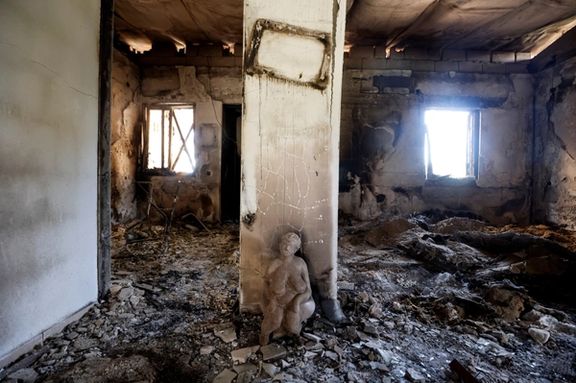
The US has proposed a draft UN Security Council resolution that says Israel has a right to defend itself and demands Iran stop arming "militias and terrorist groups."
The draft text calls for the protection of civilians - including those who are trying to get to safety - notes that states must comply with international law when responding to "terrorist attacks", and urges the "continuous, sufficient and unhindered" delivery of aid to the Gaza Strip, according to Reuters.
It was not immediately clear if or when the United States planned to put the draft resolution to a vote. To pass, a resolution needs at least nine votes in favor and no vetoes by Iran allies Russia, China.
There was no response by Tehran as of Sunday morning. Government media mentioned the news in passing, while it had less coverage of the conflict compared to previous days.
The move by the United States comes after it vetoed a Brazilian-drafted text on Wednesday that would have called for humanitarian pauses in the conflict between Israel and Palestinian Hamas militants, to allow aid access to Gaza.
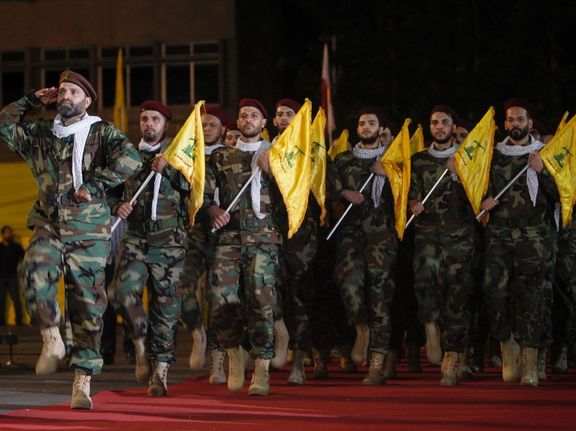
Israel has vowed to wipe out the Hamas Islamist group that rules Gaza, after its gunmen burst through the barrier fence surrounding the enclave on October 7 and rampaged through Israeli towns and kibbutzes, killing 1,400 people.
Israel has since pounded Gaza from the air, imposed a siege and is preparing for a ground offensive. Palestinian authorities say more than 4,000 people have been killed in the enclave. The UN says more than a million have been made homeless.
Iranian regime officials throughout the week continued threatening to expand the war if Israeli attacks on Gaza do not stop. Iran’s intelligence chief, Esmail Khatib, warned the United Statesand other ‘supporters’ of Israel on Saturday that they would face a ‘harsh, fatal revenge’ from God and the people.
Israel's Minister of Economy and Industry, Nir Barkat, warned that Israel would take action not only against the Hezbollah but also against Iran if Hezbollah takes action against Israel on its northern border, claiming "we will go to the head of the snake, which is Iran".
The US draft text does not call for any pause or truce in the fighting. It calls on all states to try and stop the "violence in Gaza from spilling over or expanding to other areas in the region, including by demanding the immediate cessation by Hezbollah and other armed groups of all attacks."
Lebanon's Iran-backed, heavily armed Hezbollah group has clashed with Israel across the Lebanese border multiple times since October 7 in the deadliest confrontations since they fought a month-long war in 2006.
SELF-DEFENSE
The US draft resolution demands Iran stops exporting arms to groups threatening peace and security across the region, including Hamas.
Iran has made no secret of its backing for Hamas, funding and arming the group and another Palestinian militant organization Islamic Jihad. Hamas officials have also confirmed that they received weapons from Iran and Hezbollah.
Article 51 covers the individual or collective right of states to self-defense against armed attack and states must immediately inform the 15-member Security Council of any action that states take in self-defense against armed attack.
In a letter sent the same day as the Hamas attack, Israel told the council it would "act in any way necessary to protect its citizens and sovereignty from the ongoing terrorist attacks originating from the Gaza Strip." But it does not appear to have formally invoked Article 51, diplomats said.
Arab countries have argued that Israel cannot justify its actions as self-defense.
"The Gaza Strip is an occupied territory," Jordan's UN Ambassador Mahmoud Daifallah Hmoud told the council on October 16, citing a 2004 opinion by the International Court of Justice on an Israeli separation barrier built around the West Bank.
With reporting by Reuters
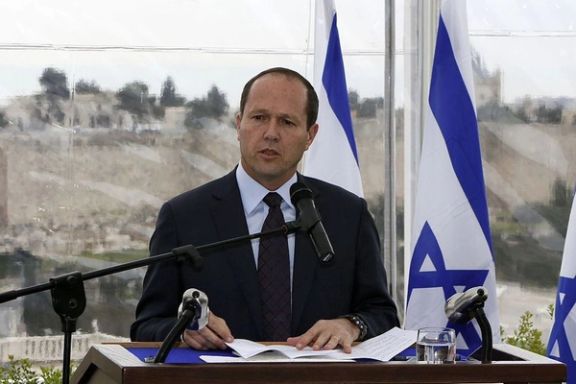
Israel says it will cut off “the head of the snake” and launch a military attack on Iran if Hezbollah joins the war against Iran-backed Hamas.
In an exclusive interview with The Mail on Sunday, Israel's Minister of Economy and Industry, Nir Barkat, stated that Israel would take action not only against Hezbollah but also against Iran if Hezbollah takes action against Israel on its northern border, claiming "we will go to the head of the snake, which is Iran".
The warnings come after consistent threats from Tehran that if Israel does not cease its air attack on Gaza following Hamas' declaration of war on October 7, it will activate its other proxies, from Hezbollah in Lebanon to the Houthis in Yemen. A potential Israeli ground operation further raises tensions.
Hezbollah has become increasingly active on Israel's northern border since the war broke out following a Hamas rocket barrage and infiltration of thousands of its terrorists by air, land and sea, massacring hundreds of civilians in the most deadly day for Jews since the Holocaust. Its troops have been caught infiltrating the northern border as well as sending UAVs and anti-tank missiles.
Israel's Institute of National Security Studies estimates Hezbollah's troops to be between 50,000 and 100,000. It is Iran's most powerful proxy in the Middle East.
Barakat added, “Lebanon and Hezbollah are going to pay a heavy price, similar to what Hamas is going to pay. But that's not enough…The very clear message is that we are going to be going after the heads of Iran as well. When will we do that? When we decide,” he underlined.
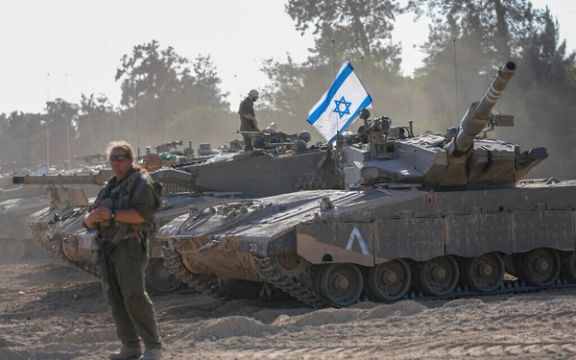
Iran’s intelligence chief has warned the United States and other ‘supporters’ of Israel that they would face a ‘harsh, fatal revenge’ from God and the people.
Condemning Israel for what he called ‘genocide in Gaza’, Esmaeil Khatib on Saturday called the October 7 operation the “most complex and most effective” operation by the ‘resistance front’.
Khatib’s rhetoric come amid deep concerns that the conflict between Israel and Hamas would escalate into a full-blown regional war involving proxies of the Islamic Republic –which regime officials call the ‘resistance front.’
Unconfirmed reports emerged Saturday that the IRGC Quds Force Commander Ismail Qaani has traveled to Syria to “supervise” the Iran-backed armed groups along the Syrian border with Israel.
Official and state-affiliated media have not confirmed nor denied this report –which, if true, could be read as a sign of imminent escalation or a bluff of that.
In the week gone by, Houthis in Yemen and Hezbollah in Lebanon, both supported by Iran, have entered the war theater, albeit on a limited scale and with no official declaration of war.
Hezbollah’s shelling of northern Israel has forced the preemptive evacuation of around 20,000 people from border areas. Israel has bombarded Hezbollah targets in southern Lebanon daily, killing 19 militants to date, per Al Jazeera English.
On Saturday, Hezbollah’s number 2, Naim Qassem threatened Israelwith an augmented involvement in the conflict.
“Let's be clear,” Hezbollah’s Deputy Secretary General said, “as events unfold, if something comes up that calls for greater intervention by us, we will do so,” implying that a ground invasion of Gaza would take the Iran-backed group to its next level of engagement.
On the Israeli side, Defense Minister Yoav Gallant said Saturday “Hezbollah has decided to participate in the fighting, we are exacting a heavy price from it.”
As the conflict deepens and broadens, so do diplomatic and humanitarian efforts to mitigate the damage of war and prevent a catastrophic outcome.
Egypt hosted a major peace summit Saturday, where regional leaders and high-ranking officials from western powers met to discuss ways to de-escalate the Hamas-Israel war.
The summit coincided with a temporary opening of the Rafah crossing (from Egypt to Gaza), allowing vital aid to get into the enclave.
On Saturday, five UN agencies expressed concern about the worsening conditions in Gaza and called for a humanitarian ceasefire.
Jordan's King Abdullah II criticized Israel's siege and bombardment of Gaza, calling it ‘collective punishment’ and a "war crime." Jordan is a close US ally and has had good relations with Israel for almost three decades. King Abdullah’s stance signals a growing unease with the ongoing conflict in the region.
The World Food Programme (WFP), the World Health Organization (WHO), the UN's Development Programme (UNDP), the UN’s Population Fund (UNFPA) and its International Children's Emergency Fund (Unicef) said in a statement: “Gaza was a desperate humanitarian situation before the most recent hostilities. It is now catastrophic”.
The Biden administration now finds itself in an unenviable position: pressured from the international community to call for a ceasefire and pushed at home by those wanting to see a tougher stance.
And at the heart of Biden’s problems lies the Islamic Republic of Iran.
The regime in Iran holds some leverage through its armed proxies across the region, which makes Biden hesitant in his approach towards Iran. On the other hand, Republican lawmakers have been hammering Biden for many months, especially since the exposure of an Iran influence network and the $6 billion ransom to free five Iranian-American hostages held in Tehran.
The US proposed a draft UN Security Council resolution on Saturday that demands Iran stop exporting arms to "militias and terrorist groups threatening peace and security across the region” including Hamas, according to the draft text seen by Reuters.